小学四年级英语一般现在时
四年级英语语法
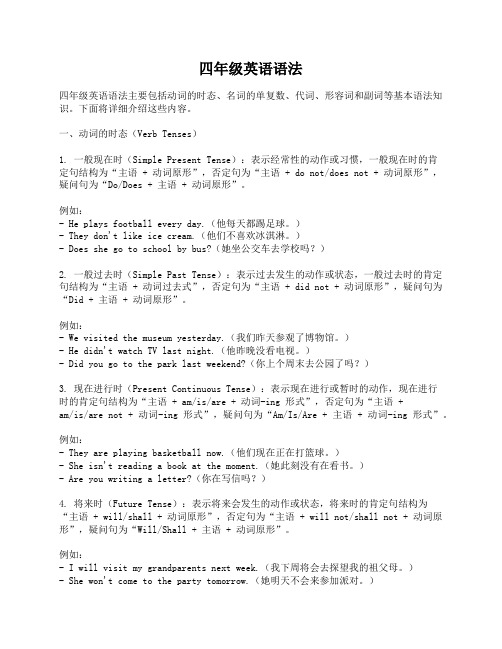
四年级英语语法四年级英语语法主要包括动词的时态、名词的单复数、代词、形容词和副词等基本语法知识。
下面将详细介绍这些内容。
一、动词的时态(Verb Tenses)1. 一般现在时(Simple Present Tense):表示经常性的动作或习惯,一般现在时的肯定句结构为“主语 + 动词原形”,否定句为“主语 + do not/does not + 动词原形”,疑问句为“Do/Does + 主语 + 动词原形”。
例如:- He plays football every day.(他每天都踢足球。
)- They don't like ice cream.(他们不喜欢冰淇淋。
)- Does she go to school by bus?(她坐公交车去学校吗?)2. 一般过去时(Simple Past Tense):表示过去发生的动作或状态,一般过去时的肯定句结构为“主语 + 动词过去式”,否定句为“主语 + did not + 动词原形”,疑问句为“Did + 主语 + 动词原形”。
例如:- We visited the museum yesterday.(我们昨天参观了博物馆。
)- He didn't watch TV last night.(他昨晚没看电视。
)- Did you go to the park last weekend?(你上个周末去公园了吗?)3. 现在进行时(Present Continuous Tense):表示现在进行或暂时的动作,现在进行时的肯定句结构为“主语 + am/is/are + 动词-ing 形式”,否定句为“主语 +am/is/are not + 动词-ing 形式”,疑问句为“Am/Is/Are + 主语 + 动词-ing 形式”。
例如:- They are playing basketball now.(他们现在正在打篮球。
)- She isn't reading a book at the moment.(她此刻没有在看书。
小学四年级时态和语态用法总结

小学四年级时态和语态用法总结一、一般现在时态一般现在时态用来表示经常性的动作、习惯、常态、常规以及现时的判断等。
1. 肯定句结构:主语+ 动词原形/动词第三人称单数形式(he/she/it)+ 其他例如:- I play basketball every day.- She goes to school by bus.2. 否定句结构:主语 + do not/does not(doesn’t)+ 动词原形 + 其他例如:- They do not drink soda.- He doesn’t like swimming.3. 一般疑问句结构:Do/Does + 主语 + 动词原形 + 其他?例如:- Do you like ice cream?- Does he play the piano?4. 特殊疑问句结构:特殊疑问词 + 一般疑问句结构- What do you do in your free time?- Where does she live?二、一般过去时态一般过去时态用来表示过去发生的单个动作或状态。
1. 肯定句结构:主语 + 动词过去式 + 其他例如:- We watched a movie last night.- She studied English for two hours yesterday.2. 否定句结构:主语 + did not(didn’t)+ 动词原形 + 其他例如:- I did not go to the party.- He didn’t finish his homework.3. 一般疑问句结构:Did + 主语 + 动词原形 + 其他?例如:- Did you eat breakfast this morning?- Did they play soccer yesterday?4. 特殊疑问句结构:特殊疑问词 + 一般疑问句结构- When did you go to bed last night?- Where did she buy her new dress?三、一般将来时态一般将来时态用来表示将来某个时间要发生的动作或存在的状态。
小学四年级重要知识总结一般现在时的用法
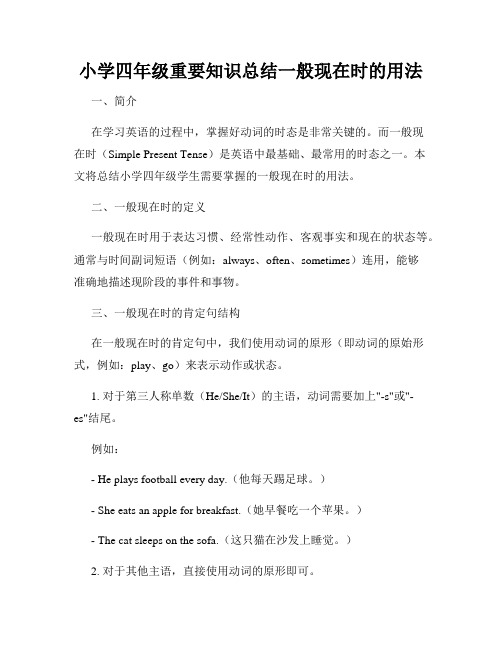
小学四年级重要知识总结一般现在时的用法一、简介在学习英语的过程中,掌握好动词的时态是非常关键的。
而一般现在时(Simple Present Tense)是英语中最基础、最常用的时态之一。
本文将总结小学四年级学生需要掌握的一般现在时的用法。
二、一般现在时的定义一般现在时用于表达习惯、经常性动作、客观事实和现在的状态等。
通常与时间副词短语(例如:always、often、sometimes)连用,能够准确地描述现阶段的事件和事物。
三、一般现在时的肯定句结构在一般现在时的肯定句中,我们使用动词的原形(即动词的原始形式,例如:play、go)来表示动作或状态。
1. 对于第三人称单数(He/She/It)的主语,动词需要加上"-s"或"-es"结尾。
例如:- He plays football every day.(他每天踢足球。
)- She eats an apple for breakfast.(她早餐吃一个苹果。
)- The cat sleeps on the sofa.(这只猫在沙发上睡觉。
)2. 对于其他主语,直接使用动词的原形即可。
例如:- I like ice cream.(我喜欢冰淇淋。
)- We go to school by bus.(我们坐公交车上学。
)- They study English on weekends.(他们周末学英语。
)四、一般现在时的否定句结构在一般现在时的否定句中,我们在助动词"Do/Does"后面加上"not",并使用动词的原形来表示否定的动作或状态。
1. 对于第三人称单数(He/She/It)的主语,助动词"Do"变为"Does",动词不再需要变化。
例如:- He does not play football every day.(他不每天踢足球。
小学英语一般现在时

3. My birthday is on July 1st. Is your birthday on July 1st? When is your birthday?
--The birds don't fly . --The bird doesn't fly.
03
一般疑问句及回答
一般疑问句及回答
Do
+主语 (非单三)
+动词(短 语)原形
+其他?
肯定回 答
Do
you/they /we
like
apples?
Ye s , I / t hey/w e do.
Does
一般现在时
一般现在时分为两种:
一是含有be动词的一般现在时
二是含有实义动词的一般现在时
常
见
的 1. be动词:be动词是对am,is,are的统称
两
种
2. 实义动词:有实际意义的动词。eg:walk(走) swim(游泳)
run(跑)
动 动词还有其他的分 词 类,比如系动词、
助动词等,今天我
们只学习这两种。
2.含有实义动词的一般现在时 经常出现often、usually、sometimes这类的词
01. 肯定句 02. 否定句 03. 一般疑问句 04. 特殊疑问句
01
肯
定
句
主语(非 单三)
I/They
主语(单 三)
She/He
肯定句句子结构
+动词(短语)原形
+其他。
四年级上册英语语法归纳-外研版

四年级上册英语语法归纳-外研版1. 一般现在时一般现在时用于描述经常性、习惯性的动作或状态,或者陈述普遍真理等。
句型结构主语 + 动词原形/第三人称单数形式 + 其他成分示例1. I like to play football.2. She eats an apple every day.3. They often go to the park on weekends.2. 现在进行时现在进行时用于描述正在进行的动作。
句型结构主语 + be动词 + 动词-ing形式 + 其他成分示例1. He is reading a book now.2. We are watching a movie at the cinema.3. They are playing basketball in the gym.3. 一般过去时一般过去时用于描述过去发生的动作或状态。
句型结构主语 + 动词过去式 + 其他成分示例1. I visited my grandparents last weekend.2. She played the piano when she was young.3. They lived in London before.4. 现在完成时现在完成时用于描述过去发生的动作对现在造成的影响或结果。
句型结构主语 + have/has + 动词过去分词 + 其他成分示例1. I have finished my homework.2. She has traveled to many countries.3. They have seen that movie before.5. 一般将来时一般将来时用于描述将来会发生的动作或状态。
句型结构主语 + will + 动词原形 + 其他成分示例1. I will visit my friend tomorrow.2. She will go shopping on Saturday.3. They will have a party next week.6. 祈使句祈使句用于发出请求、命令、建议等。
新版PEP四年级上册英语语法表

新版PEP四年级上册英语语法表以下是新版PEP四年级上册英语教材中涉及的语法内容的总结和示例。
1. 一般现在时 (Simple Present Tense)- 用法:表示经常、惯性或普遍的动作或状态。
- 示例:- I eat eggs for breakfast every day. (我每天早餐吃鸡蛋。
)- He walks to school with his friends. (他和他的朋友们一起步行去上学。
)2. 一般过去时 (Simple Past Tense)- 用法:表示过去某个时间发生的动作或状态。
- 示例:- Yesterday, I visited my grandparents. (昨天,我去看望了我的祖父母。
)- They played soccer in the park last weekend. (上周末,他们在公园里踢足球。
)3. 现在进行时 (Present Continuous Tense)- 用法:表示现在正在进行的动作。
- 示例:- The children are playing in the garden. (孩子们正在花园里玩。
)- She is reading a book at the moment. (她此刻正在看书。
)4. 一般将来时 (Simple Future Tense)- 用法:表示将来某个时间要发生的动作或状态。
- 示例:- I will go to the movies with my friends tomorrow. (我明天会和朋友去看电影。
)- They are going to travel to Japan next month. (他们下个月将要去日本旅行。
)5. 句子否定形式 (Negative Sentences)- 用法:表示否定的意思。
- 示例:- I don't like ice cream. (我不喜欢冰淇淋。
小学四种英语时态的归纳总结

千里之行,始于足下。
小学四种英语时态的归纳总结小学英语时态的归纳总结在小学阶段学习英语,掌握四种基本的时态是非常重要的。
这四种时态分别是一般现在时、一般过去时、一般将来时和现在进行时。
以下是对这四种时态的归纳总结。
一、一般现在时(Simple Present Tense)1. 表示经常性的动作或状态。
例如:I play basketball every Saturday.2. 在陈述句中,主语和动词要一致。
例如:He likes to watch movies.3. 在否定句中,用do / does + not + 动词原形。
例如:She does not like vegetables.4. 在疑问句中,用do / does + 主语 + 动词原形?例如:Do you have any pets?5. 用于表示客观事实、经验等。
二、一般过去时(Simple Past Tense)1. 表示过去发生的动作或状态。
例如:I watched a movie yesterday.2. 在陈述句中,动词过去式的变化规则是直接加-ed。
例如:We played soccer last week.3. 在否定句中,用did + not + 动词原形。
例如:She did not go to school yesterday.4. 在疑问句中,用did + 主语 + 动词原形?例如:Did you finishyour homework?第1页/共3页锲而不舍,金石可镂。
三、一般将来时(Simple Future Tense)1. 表示将来发生的动作或状态。
例如:I will go to the park tomorrow.2. 在陈述句中,用will / shall + 动词原形。
例如:She will visither grandparents next week.3. 在否定句中,用will not / won't + 动词原形。
小学英语语法时态讲解与归纳一般现在时

千里之行,始于足下。
小学英语语法时态讲解与归纳一般现在时一般现在时(Simple Present Tense)是表示经常性、习惯性或普遍性的动作或状态的时态。
它用于描述我们现在经常或总是发生的动作、习惯、经验、事实和固定的真理。
下面是小学英语语法时态讲解与归纳一般现在时的内容:1. 构成一般现在时的肯定句结构为:主语 + 动词原形(第三人称单数加-s)+ 其他。
例如:- I play soccer every Saturday.(我每个星期六踢足球。
)- She eats an apple every morning.(她每天早上吃一个苹果。
)2. 第三人称单数的变化在一般现在时中,第三人称单数的动词要加上-s、-es或-ies。
例如:- She plays soccer every Saturday.(她每个星期六踢足球。
)- He eats an apple every morning.(他每天早上吃一个苹果。
)- My brother watches TV every night.(我的哥哥每天晚上看电视。
)3. 否定句和疑问句第1页/共3页锲而不舍,金石可镂。
- 否定句:在动词前加do not(don't)或does not(doesn't)。
例如:- I don't play soccer every Saturday.(我不是每个星期六踢足球。
)- She doesn't eat an apple every morning.(她不是每天早上吃一个苹果。
)- 疑问句:将助动词do(does)提到主语前。
例如:- Do you play soccer every Saturday?(你每个星期六踢足球吗?)- Does she eat an apple every morning?(她每天早上吃一个苹果吗?)4. 频率副词频率副词用来修饰动词,表示动作发生的频率。
小学英语语法时态一般现在时
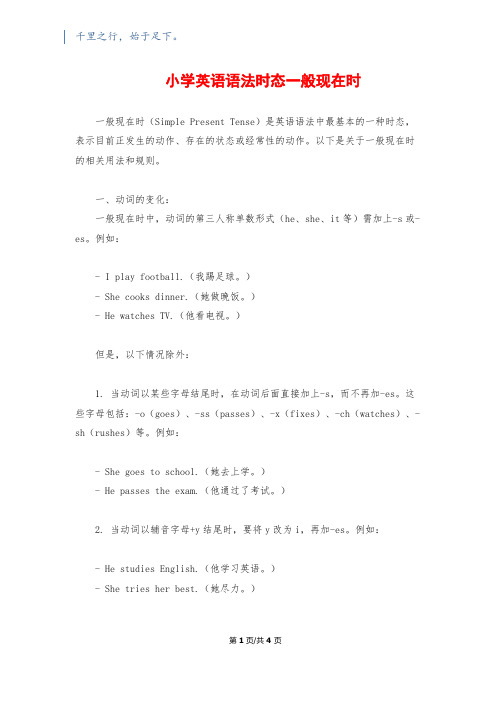
小学英语语法时态一般现在时一般现在时(Simple Present Tense)是英语语法中最基本的一种时态,表示目前正发生的动作、存在的状态或经常性的动作。
以下是关于一般现在时的相关用法和规则。
一、动词的变化:一般现在时中,动词的第三人称单数形式(he、she、it等)需加上-s或-es。
例如:- I play football.(我踢足球。
)- She cooks dinner.(她做晚饭。
)- He watches TV.(他看电视。
)但是,以下情况除外:1. 当动词以某些字母结尾时,在动词后面直接加上-s,而不再加-es。
这些字母包括:-o(goes)、-ss(passes)、-x(fixes)、-ch(watches)、-sh(rushes)等。
例如:- She goes to school.(她去上学。
)- He passes the exam.(他通过了考试。
)2. 当动词以辅音字母+y结尾时,要将y改为i,再加-es。
例如:- He studies English.(他学习英语。
)- She tries her best.(她尽力。
)第1页/共4页3. 当动词以-e结尾时,只需加上-s。
例如:- They write letters.(他们写信。
)- He can dance.(他会跳舞。
)二、用法:1. 描述客观事实或经常性动作:一般现在时常用于描述客观事实或经常性动作。
例如:- Water boils at 100 degrees Celsius.(水沸腾的温度是100摄氏度。
)- I usually go to bed at 10 o'clock.(我通常在10点钟上床睡觉。
)2. 描述现阶段的状态:一般现在时还可用来描述现阶段的状态或对现实情况的评论。
例如:- They live in New York.(他们住在纽约。
)- She looks tired.(她看起来很累。
小学英语之时态——一般现在时
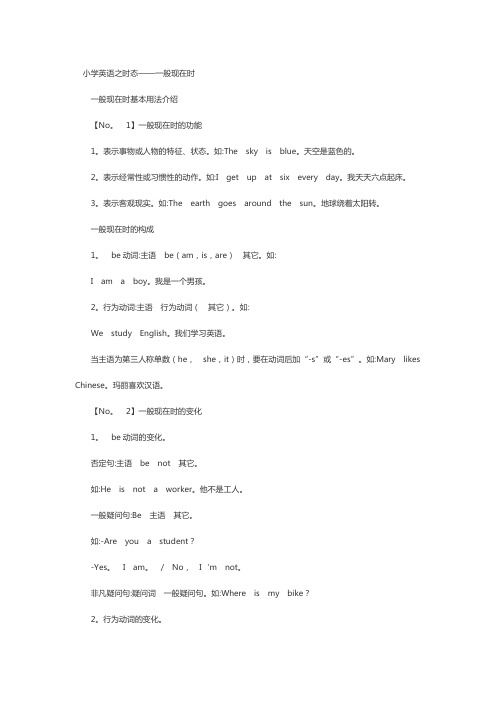
小学英语之时态——一般现在时一般现在时基本用法介绍【No。
1】一般现在时的功能1。
表示事物或人物的特征、状态。
如:The sky is blue。
天空是蓝色的。
2。
表示经常性或习惯性的动作。
如:I get up at six every day。
我天天六点起床。
3。
表示客观现实。
如:The earth goes around the sun。
地球绕着太阳转。
一般现在时的构成1。
be动词:主语be(am,is,are)其它。
如:I am a boy。
我是一个男孩。
2。
行为动词:主语行为动词(其它)。
如:We study English。
我们学习英语。
当主语为第三人称单数(he,she,it)时,要在动词后加“-s”或“-es”。
如:Mary likes Chinese。
玛丽喜欢汉语。
【No。
2】一般现在时的变化1。
be动词的变化。
否定句:主语be not 其它。
如:He is not a worker。
他不是工人。
一般疑问句:Be 主语其它。
如:-Are you a student?-Yes。
I am。
/ No,I‘m not。
非凡疑问句:疑问词一般疑问句。
如:Where is my bike?2。
行为动词的变化。
否定句:主语don’t(doesn‘t )动词原形(其它)。
如:I don’t like bread。
当主语为第三人称单数时,要用doesn‘t构成否定句。
如:He doesn’t often play。
一般疑问句:Do(Does )主语动词原形其它。
如:- Do you often play football?- Yes,I do。
/ No,I don‘t。
当主语为第三人称单数时,要用does构成一般疑问句。
如:- Does she go to work by bike?- Yes,she does。
/ No,she doesn’t。
动词s的变化规则1.一般情况下,直接加-s,如:cook-cooks,milk-milks2.以s。
四年级英语一般现在时练习50题

四年级英语一般现在时练习50题1.She _____ to school by bus every day.A.goB.goesC.goingD.to go答案:B。
一般现在时中,当主语是第三人称单数时,动词要用第三人称单数形式。
she 是第三人称单数,go 的第三人称单数形式是goes。
2.We _____ our homework in the evening.A.doB.doesC.doingD.to do答案:A。
we 是第一人称复数,一般现在时中动词用原形。
3.He _____ football on Sundays.A.playB.playsC.playingD.to play答案:B。
he 是第三人称单数,play 的第三人称单数形式是plays。
4.They _____ books in the library.B.readsC.readingD.to read答案:A。
they 是第三人称复数,一般现在时中动词用原形。
5.I _____ swimming in summer.A.goB.goesC.goingD.to go答案:A。
I 是第一人称单数,一般现在时中动词用原形。
6.My mother _____ cooking every day.A.doB.doesC.doingD.to do答案:B。
my mother 是第三人称单数,do 的第三人称单数形式是does。
7.My father _____ to work by car.A.goB.goesC.going答案:B。
my father 是第三人称单数,go 的第三人称单数形式是goes。
8.My sister _____ music.A.likeB.likesC.likingD.to like答案:B。
my sister 是第三人称单数,like 的第三人称单数形式是likes。
9.I _____ to school on foot.A.goB.goesC.goingD.to go答案:A。
一般现在时知识点

译林版小学英语四年级语法——一般现在时知识点1. 一般现在时用于描述现阶段的习惯、常规、真理或普遍事实。
- She brushes her teeth every morning.(她每天早上刷牙。
)- They always go to the park on Sundays.(他们总是在星期天去公园。
)2. 一般现在时的肯定句为:主语+ 动词原形(第三人称单数主语需要加-s或-es)。
- He watches TV every evening.(他每天晚上看电视。
)- The cat sleeps on the sofa.(猫在沙发上睡觉。
)3. 一般现在否定句结构为:主语+ do not (don't) + 动词原形(第三人称单数主语需要加-s或-es)。
- They do not (don't) play basketball.(他们不打篮球。
)- She does not (doesn't) like spicy food.(她不喜欢辣食。
)4. 一般现在时的疑问句结构为动词原形(第三人称单数主语需要用Does)+ 其他。
- Do you like ice cream? (你喜欢冰淇淋吗?)- Does he play the piano? (他会弹钢琴吗?)5. 在第三人称单数主语中,动词要加-s或-es,例如:he, she, it。
- Mary always brings her dog to the park.(玛丽总是带她的狗去公园。
)- The sun rises in the east.(太阳从东方升起。
)6. 如果动词以辅音字母+y结尾,将y变为i,再加-es,例如:fly→flies。
- My sister studies hard every day.(我妹妹每天都很用功学习。
)- The butterfly flies in the sky.(蝴蝶在天空中飞翔。
小学四年级英语语法专项:一般现在时
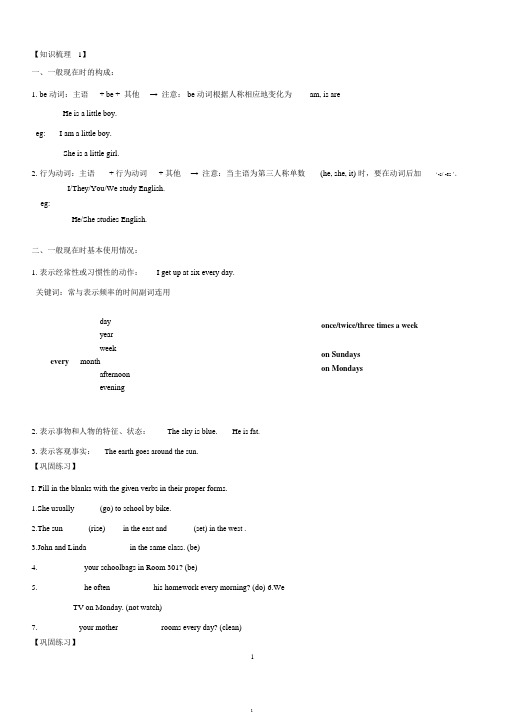
【知识梳理1】一、一般现在时的构成:1. be 动词:主语+ be + 其他→ 注意: be 动词根据人称相应地变化为am, is areHe is a little boy.eg:I am a little boy.She is a little girl.2. 行为动词:主语+ 行为动词+ 其他→ 注意:当主语为第三人称单数(he, she, it) 时,要在动词后加‘-s/ -es ’。
I/They/You/We study English.eg:He/She studies English.二、一般现在时基本使用情况:1. 表示经常性或习惯性的动作:I get up at six every day.关键词:常与表示频率的时间副词连用dayyearweekevery monthafternoonevening2. 表示事物和人物的特征、状态:The sky is blue.He is fat.3. 表示客观事实:The earth goes around the sun.【巩固练习】I. Fill in the blanks with the given verbs in their proper forms.1.She usually ______(go) to school by bike.2.The sun ______(rise)in the east and ______ (set) in the west .3.John and Linda __________ in the same class. (be)4.__________ your schoolbags in Room 301? (be)5.__________ he often __________ his homework every morning? (do)6.We __________ TV on Monday. (not watch)7.__________ your mother __________ rooms every day? (clean)【巩固练习】once/twice/three times a weekon Sundayson MondaysI.选择最恰当的答案() 1. _______ you have a book?A. DoB. AreC. IsD. Have() 2. They ________ on a farm.A. workingB. is workC. workD. is worked() 3. ---- Does Peter like to watch TV?---- _________.A. Yes, he likesB. No, he doesn’tC. Yes, he’ d likeD. No, he likes() 4. She doesn’ t _________ her homework in the afternoon.A. doingB. to doC. doesD. do() 5. How _________ Mr. Brown _________ to America?A. do, goB. is, goC. does, goD. does, goes() 6. Where ’ s my camera? I __________ it.A. am not findingB. am not seeingC. can ’ t findD. can ’t look at() 7. ---- How _________ he go to work?---- He _________ to work by bike.A. does; goB. do; goesC. do; goD. does; goes() 8. ---- ______ you usually late for school?---- No, _____________.A. Do; I amB. Does; notC. Are; I’ m notD. Are; I aren’t () 9. _______ she ________ home at six every day?A. Is, leaveB. Does, leaveC. Is, leavesD. Does, left() 10. Mr. Yang __________ English this term.A. teaches ourB. teaches usC. teach usD. teach our【知识梳理2】be 动词,行为动词句型:1.Be动词一般现在时的句型肯定句: sb+ be+其他be 根据人称变为am, is, areeg: He is a teacher.I am a student.They are workers.否定句: sb+ be+not+其他eg: He is not a teacher.I am not a student.They are not workers.一般疑问句: be+sb+其他Is he a teacher?-Yes, he is. / No, he isn’ t.Are you a student?Are they workers?特殊疑问句: What is he?2. 行为动词的变化肯定式: sb +do+ 其他eg: I like pork.第三人称单数:sb+does+ 其他eg: He likes pork.否定式: sb +don ’其t+他eg:I don’ t like pork. 第三人称单数:sb+doesn ’其t+他eg: He doesn’ t like pork.一般疑问句 : Do+ sb + 其他第三人称单数:Does + sb +其他eg: Do you like pork?eg:Does he like pork?-Yes, I do. / No, I don’ t.-Yes, he does. / No, he doesn .’t 特殊疑问句:What do you like? / What does he like?【例题精讲】1.按要求改写句子:1.Do you often play football after school? ( 肯定回答 ) __________________________________________.2.I have many books. (改为否定句) ___________________________________________.3. Gao Shan’ s sistereslikplaying table tennis (改为否定句)______________________________________________.4.She lives in a small town near New York. ( 改为一般疑问句) ______________________________________________.5.I watch TV every day. (改为一般疑问句) _______________________________________________ .【巩固练习】1.用括号内动词的适当形式填空1.He often ________ (have) dinner at home.2.Daniel and Tommy _______ (be) in Class One.3.We _______ (not watch) TV on Monday.4.Nick _______ (not go) to the zoo on Sunday.5.______ they ________ (like) the World Cup?6.What _______they often _______ (do) on Saturdays?7._______ your parents _______ (read) newspapers every day?8.The girl _______ (teach) us English on Sundays.9.She and I ________ (take) a walk together every evening.10.There ________ (be) some water in the bottle.基础题:I.用括号内动词的适当形式填空1.Mike _______ (like) cooking.2.They _______ (have) the same hobby.3.My aunt _______ (look) after her baby carefully.4.You always _______ (do) your homework well.5. I _______ (be) ill. I’ m staying in bed.6.She _______ (go) to school from Monday to Friday.7.Liu Tao _______ (do) not like PE.8.The child often _______ (watch) TV in the evening.9.Su Hai and Su Yang _______ (have) eight lessons this term.10. ---- What day _______ (be) it today? ---- It ’ s Saturday.II.按要求改写句子。
四年级上册英语语法知识点总结
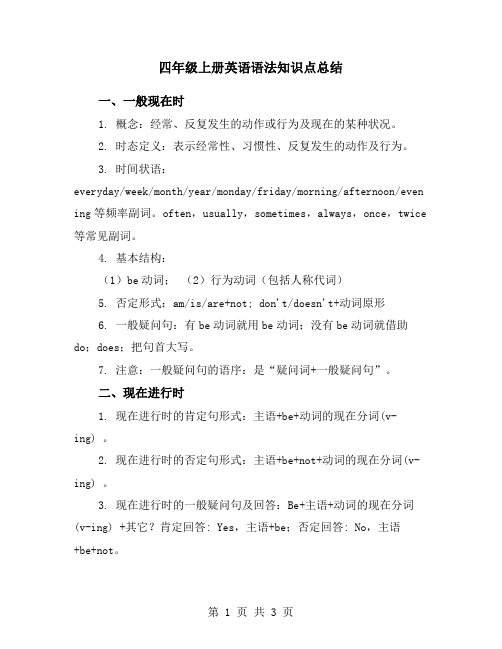
四年级上册英语语法知识点总结一、一般现在时1. 概念:经常、反复发生的动作或行为及现在的某种状况。
2. 时态定义:表示经常性、习惯性、反复发生的动作及行为。
3. 时间状语:everyday/week/month/year/monday/friday/morning/afternoon/even ing等频率副词。
often,usually,sometimes,always,once,twice 等常见副词。
4. 基本结构:(1)be动词;(2)行为动词(包括人称代词)5. 否定形式:am/is/are+not; don't/doesn't+动词原形6. 一般疑问句:有be动词就用be动词;没有be动词就借助do;does;把句首大写。
7. 注意:一般疑问句的语序:是“疑问词+一般疑问句”。
二、现在进行时1. 现在进行时的肯定句形式:主语+be+动词的现在分词(v-ing) 。
2. 现在进行时的否定句形式:主语+be+not+动词的现在分词(v-ing) 。
3. 现在进行时的一般疑问句及回答:Be+主语+动词的现在分词(v-ing) +其它?肯定回答: Yes,主语+be;否定回答: No,主语+be+not。
4. 现在分词的变化规则:一般情况下直接加ing(以e结尾的要去掉e再加ing);以不发音的e结尾的去掉e再加ing;以一个元音字母和一个辅音字母结尾的二个字母组合结尾的动词,双写后面的辅音字母再加ing(辅音是“f”结尾的要去掉f再加ing)。
三、一般将来时1. 概念:表示将要发生的动作或情况。
2. 表达形式:am/is/are going to + 动词原形;will/shall +动词原形。
其中will用于任何人称,shall只用于第三人称。
3. 时间状语:this evening, tomorrow, next week,next month等,也可用其他表示将要时间的状语。
小学英语语法-一般现在时详细讲解

千里之行,始于足下。
小学英语语法-一般现在时详细讲解一般现在时(Simple Present Tense)是英语中最常用的时态之一,表示经常性的行为、习惯、真理、现在的状态等。
以下是关于一般现在时的详细讲解:1. 用法:- 表示客观真理或事实:The sun rises in the east. (太阳从东方升起。
)- 表示经常性的行为或习惯:He reads books every night. (他每晚都看书。
)- 表示现阶段的状态或现象:She speaks three languages. (她会说三种语言。
)2. 构成:- 肯定句:主语 + 动词原形(第三人称单数形式在动词后加-s或-es)+ 其他。
- 否定句:主语 + do / does not + 动词原形 + 其他。
- 疑问句:Do / Does + 主语 + 动词原形 + 其他?3. 第三人称单数形式的规则:在一般现在时中,第三人称单数形式需要在动词后加-s或-es。
- 如果动词以-s, -sh, -ch, -x, -o结尾,加-es。
如:goes, watches。
- 如果动词以辅音字母+y结尾,将y改为i,再加-es。
如:studies。
- 其他情况直接加-s。
如:reads, eats。
4. 句型转换:第1页/共2页锲而不舍,金石可镂。
- 肯定句变为否定句:将动词前的助动词do / does 变为 do not / does not。
如:I love cats.(肯定句)→ I do not love cats.(否定句) - 肯定句变为疑问句:将助动词do / does提到主语之前。
如:Youlike pizza.(肯定句)→ Do you like pizza?(疑问句)- 否定句变为肯定句:将助动词do / does 去掉。
如:He doesn'tplay tennis.(否定句)→ He plays tennis.(肯定句)- 否定句变为疑问句:将助动词do / does提到主语之前,并去掉not。
四年级英语一般现在时单选题40题
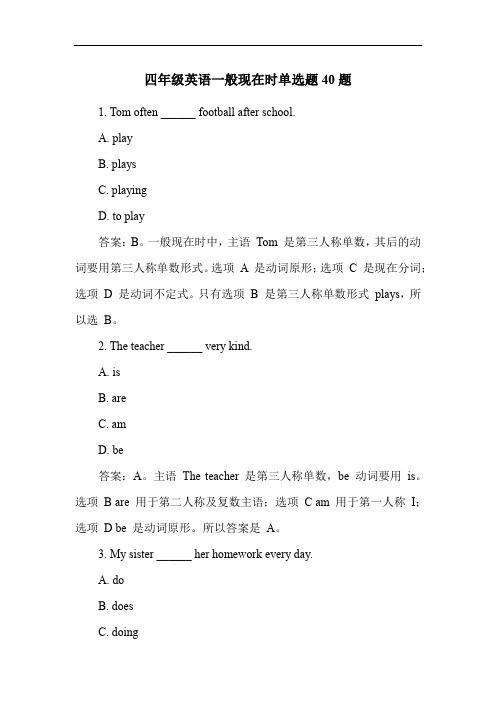
四年级英语一般现在时单选题40题1. Tom often ______ football after school.A. playB. playsC. playingD. to play答案:B。
一般现在时中,主语Tom 是第三人称单数,其后的动词要用第三人称单数形式。
选项A 是动词原形;选项C 是现在分词;选项D 是动词不定式。
只有选项B 是第三人称单数形式plays,所以选B。
2. The teacher ______ very kind.A. isB. areC. amD. be答案:A。
主语The teacher 是第三人称单数,be 动词要用is。
选项B are 用于第二人称及复数主语;选项C am 用于第一人称I;选项D be 是动词原形。
所以答案是A。
3. My sister ______ her homework every day.A. doB. doesC. doingD. to do答案:B。
主语My sister 是第三人称单数,动词要用第三人称单数形式。
选项A 是动词原形;选项C 是现在分词;选项D 是动词不定式。
does 是do 的第三人称单数形式,所以选B。
4. He ______ to school by bike.A. goB. goesC. goingD. to go答案:B。
主语He 是第三人称单数,其后的动词要用第三人称单数形式。
选项 A 是动词原形;选项C 是现在分词;选项D 是动词不定式。
goes 是go 的第三人称单数形式,故选B。
5. The dog ______ very cute.A. isB. areC. amD. be答案:A。
主语The dog 是第三人称单数,be 动词要用is。
选项B are 用于第二人称及复数主语;选项C am 用于第一人称I;选项D be 是动词原形。
所以答案是A。
6. I ______ play football every day.A. alwaysB. sometimesC. neverD. often答案:A。
四年级英语一般现在时练习题40题

四年级英语一般现在时练习题40题1.She often_____to school by bike.A.goB.goesC.goingD.to go答案:B。
本题考查一般现在时第三人称单数形式。
主语是she,是第三人称单数,谓语动词要用goes。
选项A go 是原形,主语不是第三人称单数时使用;选项C going 是现在分词形式,不能单独作谓语;选项D to go 是动词不定式,也不能单独作谓语。
2.He_____his homework after school.A.doB.doesC.doingD.to do答案:B。
主语是he,第三人称单数,谓语动词用does。
选项 A do 是原形;选项C doing 是现在分词;选项D to do 是动词不定式。
3.My mother_____cooking every day.A.likeB.likesC.likingD.to like答案:B。
主语my mother 是第三人称单数,谓语动词用likes。
选项 A like 是原形;选项C liking 是现在分词;选项D to like 是动词不定式。
4.The cat_____fish.A.likeB.likesC.likingD.to like答案:B。
主语the cat 是第三人称单数,谓语动词用likes。
选项 A like 是原形;选项C liking 是现在分词;选项D to like 是动词不定式。
5.My father_____newspapers in the morning.A.readB.readsC.readingD.to read答案:B。
主语my father 是第三人称单数,谓语动词用reads。
选项 A read 是原形;选项C reading 是现在分词;选项D to read 是动词不定式。
6.She_____English very well.A.speakB.speaksC.speakingD.to speak答案:B。
四年级英语一般现在时单选题40题
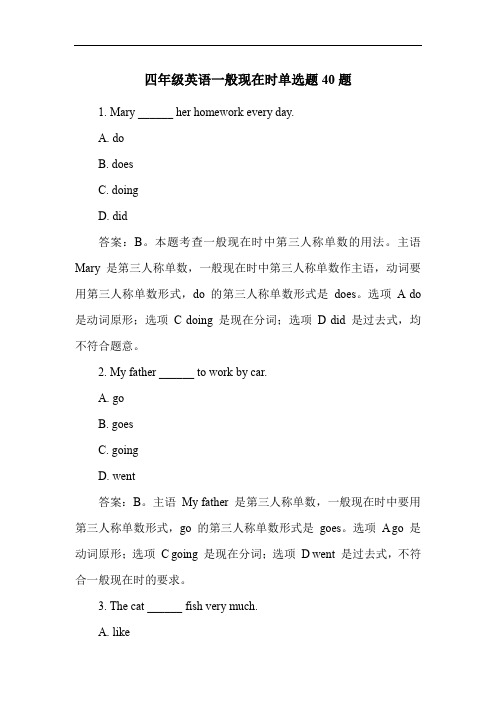
四年级英语一般现在时单选题40题1. Mary ______ her homework every day.A. doB. doesC. doingD. did答案:B。
本题考查一般现在时中第三人称单数的用法。
主语Mary 是第三人称单数,一般现在时中第三人称单数作主语,动词要用第三人称单数形式,do 的第三人称单数形式是does。
选项 A do 是动词原形;选项C doing 是现在分词;选项D did 是过去式,均不符合题意。
2. My father ______ to work by car.A. goB. goesC. goingD. went答案:B。
主语My father 是第三人称单数,一般现在时中要用第三人称单数形式,go 的第三人称单数形式是goes。
选项 A go 是动词原形;选项C going 是现在分词;选项D went 是过去式,不符合一般现在时的要求。
3. The cat ______ fish very much.A. likeB. likesC. likingD. liked答案:B。
The cat 是第三人称单数,like 在一般现在时中要变成likes。
选项A like 是动词原形;选项C liking 是现在分词;选项D liked 是过去式,都不正确。
4. She ______ swimming on Sundays.A. goB. goesC. goingD. to go答案:B。
She 是第三人称单数,go 要变成goes。
选项 A go 是原形;选项C going 是现在分词;选项D to go 是动词不定式,都不符合一般现在时中第三人称单数作主语的情况。
5. Tom ______ football with his friends.A. playB. playsC. playingD. played答案:B。
Tom 是第三人称单数,play 要变成plays。
四年级一般现在时用法

按要求改写句子
1Daniel watch TV every evening.(改为否定句)
Daniel doesn't watch TV evening.
.2、I do my homework everyday.(改为一般疑问句并作否定回答)
-Do you do your homework everyday? -No,I don't. 3、I do sport in the morning. ~~~ (就划线部分提问)
?当主语为第三人称单数hesheit时要在动词后面加当主语为第三人称单数hesheit时要在动词后面加s或es如
四年级一般现在时用法
一般现在时的功能
• 1、表示事物或人物的特征、状态。如:The sky is blue. • 天空是蓝色的。
• 2、表示经常或习惯性的动作。如:I get up at six • o'clock every day.我每天六点起床。 • 3、表示客观事实。如:The earth goes around the sun. • 地球围着太阳绕。
carry-- carries
fly-- flies wash-- washes copy-- copies fix-- fies find-- finds wish-- wishes
have-- has
用括号内单词的适当形式填空
has 1、He often__(have)dinner at home. 2、We don't watch not watch)TV on monday. ______ ( 3、Mike doesn't go ______(not go)to the zoo on sunday. Do like 4、___they ____(like)the world cup? do 5、what ____they often(do) at home? 6、The girl teaches teach)us English on saturday. ____( is 7、There __(be)some water in the bottle .
- 1、下载文档前请自行甄别文档内容的完整性,平台不提供额外的编辑、内容补充、找答案等附加服务。
- 2、"仅部分预览"的文档,不可在线预览部分如存在完整性等问题,可反馈申请退款(可完整预览的文档不适用该条件!)。
- 3、如文档侵犯您的权益,请联系客服反馈,我们会尽快为您处理(人工客服工作时间:9:00-18:30)。
【知识梳理1】一、一般现在时的构成:1. be 动词:主语 + be + 其他 → 注意:be 动词根据人称相应地变化为am, is areHe is a little boy.eg: I am a little boy.She is a little girl.2. 行为动词:主语 + 行为动词 + 其他 → 注意:当主语为第三人称单数(he, she, it) 时,要在动词后加‘-s/ -es’。
I/They/You/We study English.eg:He/She studies English.二、一般现在时基本使用情况:1. 表示经常性或习惯性的动作:I get up at six every day.关键词:常与表示频率的时间副词连用2. 表示事物和人物的特征、状态:The sky is blue. He is fat.3. 表示客观事实:The earth goes around the sun.【巩固练习】I. Fill in the blanks with the given verbs in their proper forms.1.She usually ______(go) to school by bike.2.The sun ______(rise) in the east and ______ (set) in the west .3.John and Linda __________ in the same class. (be)4. __________ your schoolbags in Room 301? (be)5. __________ he often __________ his homework every morning? (do)6.We __________ TV on Monday. (not watch)7.__________ your mother __________ rooms every day? (clean)day year week every month afternoon evening once/twice/three times a week on Sundays on MondaysAre you a student? Are they workers?特殊疑问句:What is he?2. 行为动词的变化肯定式:sb +do+其他eg: I like pork. 第三人称单数:sb+does+ 其他eg: He likes pork.否定式:sb +don’t +其他eg:I don’t like por k. 第三人称单数:sb+doesn’t +其他eg: He doesn’t like pork.一般疑问句: Do+ sb +其他第三人称单数:Does + sb +其他eg: Do you like pork? eg:Does he like pork?-Yes, I do. / No, I don’t. -Yes, he does. / N o, he doesn’t.特殊疑问句:What do you like? / What does he like?【例题精讲】1.按要求改写句子:1.Do you often play football after school? (肯定回答) __________________________________________.2. I have many books. (改为否定句)___________________________________________.3. Gao Shan’s sister likes playing table tennis (改为否定句)______________________________________________.4. She lives in a small town near New York. (改为一般疑问句)______________________________________________.5.I watch TV every day. (改为一般疑问句)_______________________________________________ .【巩固练习】1. 用括号内动词的适当形式填空1. He often ________ (have) dinner at home.2. Daniel and Tommy _______ (be) in Class One.3. We _______ (not watch) TV on Monday.4. Nick _______ (not go) to the zoo on Sunday.5. ______ they ________ (like) the World Cup?6. What _______they often _______ (do) on Saturdays?7. _______ your parents _______ (read) newspapers every day?8. The girl _______ (teach) us English on Sundays.9. She and I ________ (take) a walk together every evening.10. There ________ (be) some water in the bottle.4. -_______ you _________ at _________?(你擅长唱歌吗?)- Yes, I am5. Mr Green often ___________ in the countryside. (散步)6. I _______a red bag. But he_________ a blue one. (有)7. Mother always__________TV in the evening. (看电视)III.阅读AA train stops at a station. A young man wants to come out, but it is raining. A boy is standing under a big umbrella. The young man says to the boy. “Can you go and get us two hamburgers, one for you and one for me? Here are two dollars.” “Great!” say the boy and he goes to buy hamburgers. After some time, the boy is back. He is eating a hamburger. “Where is my hamburger?” asks the young man. “Oh, there is only one hamburger left. So I’m eating mine. Here is your dollar. ”( )1.Where is the young man ?A At a stationB Under a big umbrellaC On the train( )2. What does the young man want to buy?A UmbrellaB HamburgersC Dollars( )3. Who helps the young man?A A boyB A manC .Nobody( )4. Does the young man get a hambuger?A No ,he doesn’tB Yes ,he doesC .No ,he does( )5. Is the boy clever(聪明的)?A Yes ,he isn’tB Yes ,he isC .No ,I’m not【知识梳理1】wh-疑问句基本结构是:特殊疑问词+一般疑问句语序常用的疑问词:what, who(whom), whose, which, when, where, how, why等,回答时针对问句中的代词和副词来回答,不用yes或no来回答。
“对划线部分提问”是一种常见的句型转换题型,这类题实际上就是将所给的陈述句变为特殊疑问句。
解这类题通常分三步完成:“三步走”战略第一步:替换----找一个合适的词来替换划线部分。
第二步:提前----把替换词写在句子的开头。
第三步:改一般疑问句----把一般疑问句写在疑问词后面,注意划线部分已经被替换掉,不需要再写。
(一)注意疑问词的选择疑问词意思用法What 什么问东西、事物What day 星期几问星期几What time 什么时间问具体时间What color 什么颜色问颜色How... 怎样问情况,状态How old 多大年纪问年纪How far 多远问路程How much 多少钱;多少数量(不可数名词)How many 多少数量(可数名词)问数量Where 在哪里问地点When 何时问时间Who 谁问人Whose 谁的问主人(二)注意疑问句的语序1. 对句子的主语提问,其语序是:疑问词+谓语+其他成分?She is their teacher. → Is she their teacher?Who is their teacher?2. 对句子主语的定语提问,其语序是:疑问词+主语+谓语+其他成分?My book is over there.→Is your book over there?Whose book is over there?3. 对表语、宾语或状语提问,其语序是:疑问词+一般疑问句?He lives in Beijing. → Does he live in Beijng?例1.Tom, _______( open) the window.例2.Tom _______(open) the window.【巩固练习】根据要求改写句子:1. Please look at the blackboard. (改为否定句)__________________________________________2.Close your eyes, Linda. (改为否定句,但意思不变)______ _____ your eyes, Linda.3.on/walk/ the/ grass. (连词成句,并改为否定句)________________________________________________ 4.我们一起玩吧。
